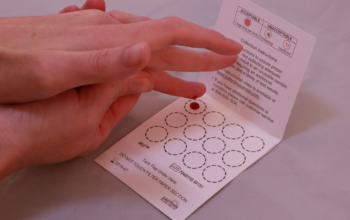Uzone.id — You’ve probably heard the idea that your blood type might reveal something about your personality—maybe from friends or while scrolling through a fan page on social media. This belief isn’t exactly new; it’s been around for centuries and has become a long-standing trend.
Long before hashtags and the FYP (For You Page) existed, the concept of blood types influencing personality traits took shape in different cultures. In places like Japan and South Korea, for instance, these theories are incredibly popular.
But is there any truth to it, or is it just another fun myth? Is there any real scientific evidence to back it up? Let’s dive in and find out!
Where did the blood type personality theory come from?
The idea that blood type shapes personality started in Japan in the early 20th century. A belief that a person’s personality is linked to their blood type is called Ketsueki-gata.
Quoted from IFL Science, In 1916, a Japanese doctor called Kimata Hara published a paper connecting blood groups to personalities, especially national-cultural temperament.

Then, in the late 1920s, Tokeji Furukawa, a popular social psychologist, published a paper called A Study of Temperament and Blood-Groups. However, it became more popular when a psychologist named Takeji Furukawa wrote a paper in 1927 suggesting that people with different blood types have different personalities.
The peak of this popularity happened in the 1970s when this idea was picked up by the journalist Masahiko Nomi. From that on, Ketsueki-gata became a self-help guide, especially for romance and business.
This theory took off and soon became a cultural phenomenon. Now, you can find everything from blood type dating advice to blood type-specific diets, especially in East Asian countries.
What’s the personality of each blood type?
Here’s a quick breakdown of the popular blood type personality theory:
Type A: People with this blood type are often described as organized, detail-oriented, and shy. They’re said to be perfectionists who like neat things and are super reliable.
Type B: B types are known as creative, passionate, and sometimes a bit selfish. They love to think outside the box and aren’t afraid to go their way.
Type AB: Those with AB blood are thought to be unique and complicated. They’re seen as calm but also unpredictable, able to switch between different personalities depending on the situation.
Type O: O types are described as confident, outgoing, and natural leaders. They’re often seen as the center of attention, good at bringing people together.
Sounds fun, right? But is there any real science behind it?
Despite how popular the theory is, most scientists agree that there’s no solid evidence linking blood type to personality traits. Blood type has everything to do with the immune system and nothing to do with the brain or personality. It’s just not biologically connected.
In 2015, a study published in PLOS ONE looked at more than 10,000 people to see if there was a link between blood type and personality. The researchers measured personality traits like openness, conscientiousness, extroversion, and emotional stability. The result? No significant connection was found between blood type and personality.
But that doesn’t mean people have stopped believing in it! In some parts of the world, blood type personality is as much a part of daily life as horoscopes. It’s even common for people to ask each other their blood type on first dates, like asking someone their zodiac sign.
Why do people believe it?
One reason could be what psychologists call the “Barnum effect.” This is when people believe in personality descriptions (like horoscopes) because they’re vague enough to apply to anyone. For example, anyone can have moments of being shy or confident, depending on the situation.
Also, humans love to find patterns and categorize things—even if there isn’t any real evidence. “We’re wired to look for meaning, even where there isn’t any,” says Dr. Alicia Clark, a psychologist who specializes in human behavior. Blood type personality theory fits into that because it gives people a simple way to explain why they, or others, act a certain way.
Should we believe and pay attention to it?
At the end of the day, whether you believe in blood type personality theory is totally up to you. While it’s fun to read about and might even feel relatable, it’s important to remember that your personality is shaped by a mix of factors, like your upbringing, environment, and personal experiences.
So, if you’re Type A but aren’t super organized, or Type B but love sticking to routines, don’t sweat it. Blood type personality theories are more like a fun conversation starter than something you should take too seriously.
















